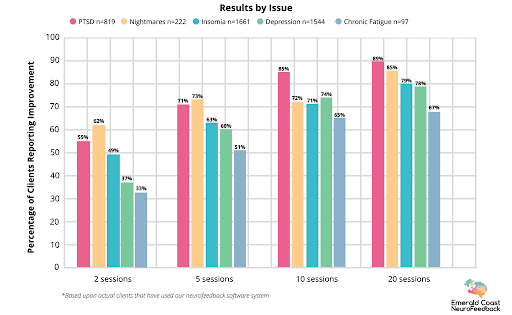
After a traumatic event, the brain may have difficulty processing what has happened. If these symptoms persist, they can be categorized and understood as "trauma and stressor-related disorders." The most well-known of these is post-traumatic stress disorder (PTSD). This occurs when someone has difficulty recovering after experiencing or witnessing a traumatic event or series of events. It can cause persistent distress, hyper-vigilance, and emotional disengagement, making everyday life a struggle and often leading to depression.
Emerald Coast NeuroFeedback (ECNF) offers a non-invasive approach to PTSD and other trauma responses. Neurofeedback works by helping the brain "unstick" itself from the negative loop of symptoms that often occurs with PTSD and other stressor-related disorders. These disorders are not a sign of weakness but a collection of information the brain is sending to indicate that the nervous system is stuck trying to process the trauma, in a state of fight or flight. The symptoms function as a sign to the body, just as pain is is a sign to alert the body to injury. The brain is sending a message that the nervous system is still dysregulated after traumatic events and is stuck in a state that causes continued distress, such as sleep disturbances, nightmares, or feelings of numbness or disconnection.
Neurofeedback for trauma and stressor-related symptoms acts like a backup parachute when the primary one has failed. The nervous system has failed to fully recover from trauma, and a backup solution is needed. This is where Neurofeedback comes in.
At ECNF, we use research-tested protocols that have been proven effective in the treatment of PTSD. These re-regulate the nervous system without the need to relive or retell the trauma. The process is entirely brain-based and effortless, engaging and training the nervous system to achieve calm naturally. It does not pretend the event(s) did not occur or that it is no longer significant. It simply trains the brain to reduce the distressing symptoms. At ECNF, we understand that some events are life-altering. Our methods respect and honor that, offering non-medication-based solutions to help you regain control of your life after trauma.
Signs of PTSD
Neurofeedback for Children
Non-invasive Training
Children may display different symptoms than adults with stressor-related disorders. Two stressor-related disorders are only diagnosable in children: reactive attachment disorder (RAD) and disinhibited social engagement disorder. These conditions are more common in children who have experienced specific types of trauma related to the ability to form healthy bonds with caregivers at an early age (e.g., children who were adopted or in foster care).
Children may also experience PTSD or any other stressor-related disorder. They may show other signs of distress, such as changes in behavior, acting younger than their age (thumb sucking, bedwetting), or display physical symptoms, such as stomach issues or headaches. While children can be especially vulnerable to the effects of trauma, they can also be especially resilient and responsive to treatment. The brain adapts quickly to new learning throughout its development. Because of this, it is typical for children to see results sooner than adults.
Neurofeedback is safe and noninvasive, making it an especially valuable option to help children return to a sense of safety and security after trauma. It is also different than counseling. This is an advantage because children often do not have the words or means to share what is happening to them. While some therapists are very skilled in working with children after trauma, most children would benefit from first regulating their nervous system before or alongside psychotherapy.
Even when a child does not satisfy the full criteria for any diagnosis, symptoms of distress can be significant and life-altering. Neurofeedback not only offers a way to improve current symptoms but also gives the brain a window into its own functioning and the opportunity to self-correct and build new neuropathways. Early intervention can tackle problems that may otherwise persist into adulthood.
How Neurofeedback Addresses PTSD
After trauma, the brain and nervous system can get stuck in a loop of repeating symptoms, indicating that the nervous system is dysregulated. At ECNF, we comprehensively evaluate symptoms to identify how to train the brain back to a state of equilibrium. Specifically, our evidence-based protocols help the brain improve connection to what is known as the "default mode network" (DMN). The DMN plays a key role in the ability to consolidate memory appropriately, integrating the experience so that the symptoms of distress are reduced. This benefits present relationships and life in general.
Neurofeedback also increases the numbers of the brain neurons responsible for mood regulation, alleviating symptoms of anxiety and depression without medication. Once the brain is in the right state to naturally process an experience, the response to triggers is reduced and symptoms are relieved.
Neurofeedback Assessment and Protocols
The ECNF alpha-theta protocol, named after the brainwaves involved during training, helps show the brain how to re-regulate itself after difficult experiences, reducing symptoms of PTSD. In a study of 819 ECNF clients reporting PTSD symptoms, including flashbacks, intrusive thoughts, reoccurring triggers, and reliving trauma, 89% of participants reported improvement after 20 Neurofeedback sessions.

Clients who train with alpha-theta Neurofeedback report numerous benefits, including:
- Reduced nightmares and improved sleep
- Reduced irritability and distractibility
- Feeling more emotionally connected/less disengaged
- Improvements in relationships
- Better ability to integrate difficult experiences and reintegrate into the present
- Improved energy and mood
By improving emotional regulation, decreasing hypervigilance, and enhancing sleep quality, Neurofeedback helps clients with PTSD reclaim their freedom and sense of self.
Integrating Neurofeedback with Traditional Methods
PTSD has traditionally been addressed via psychotherapy and medication. While these treatments can be effective for some, they are not always useful or desirable. Traditional methods may also be complemented by Neurofeedback. At ECNF, we support integrative care.
A holistic approach can offer the most comprehensive solution to PTSD and other stressor-related disorders. Neurofeedback can set the foundation for regulating the nervous system, making other effective therapies more tolerable and efficient for the client. Others may not want or need additional therapies after a course of Neurofeedback. At ECNF, we take a personalized approach and will go over the options for integrating Neurofeedback for the best results.
The Emerald Coast Neurofeedback Process
Initial Evaluation
The initial evaluation is a simple yes or no/how often series of assessment questions that will allow our therapist and software system to generate a customized protocol tailor-made for your unique needs. This enables us to identify different symptoms, goals, and growth areas for improvement during your sessions.
Feedback Sessions
Depending on your protocol(s), you may receive feedback with your eyes closed (auditory only) or with your eyes open (audio and visual). Sensors will be placed on your ears and scalp (this does not hurt, and nothing goes into your brain). The sensors pick up the electrical activity coming from your brainwaves. You may have one, two, or three sensor placement changes during each session. A session typically takes 45 minutes to an hour. This includes assessing symptom improvements since your last session and the time to change the sensors as needed for different protocols.
Session Frequency
A commitment of two sessions per week is necessary for the process to be most effective. Double sessions in a day are also available (depending on protocol, sessions may be completed back-to-back or with a small break in between). It is essential that you keep your scheduled Neurofeedback appointments. Missing sessions may result in slower progress. It is generally recommended that you receive eight sessions before taking an extended break. If you have anticipated schedule interruptions, such as a vacation, please let us know.
Re-evaluation
Your initial protocol is often the best one to accomplish your primary goals. However, it is common to see benefits from more than one protocol. Re-evaluation may be needed to explore new growth areas and determine whether protocol changes are necessary. In general, a re-evaluation is appropriate when there is less than 10% growth in all growth areas, as assessed over the previous five sessions. This often indicates that the client has maximized the benefits of an existing protocol or hit a plateau.
Neurofeedback FAQs
At ECNF, we create a personalized brain training program based on comprehensive data collected during your initial evaluation. We commonly see PTSD symptoms co-occur with symptoms of depression, traumatic brain injury, and other concerns. Your plan is designed to address your unique needs and goals. Focusing on the most important goals, we work with you to create identifiable, quantifiable growth areas, monitor your progress, and adjust as needed.
Getting Started with Emerald Coast NeuroFeedback
PTSD is not a flaw or a sign of weakness. It is a signal of a dysregulated nervous system, and Neurofeedback can help. Many of our clients have tried several other treatments before coming to us. We have helped veterans, first responders, abuse survivors, children, and adults reduce symptoms of PTSD, regain their lives, and improve relationships.
To get started with Neurofeedback, give us a call or fill out our online contact form. We will arrange a time to answer any questions and schedule your initial evaluation.
The evaluation questions do not require any details of your trauma. We will treat you with respect and dignity and start on the path to helping you. Reach out to us at Emerald Coast Neurofeedback to schedule your initial consultation.
Contact us today for more information and to schedule an appointment for your initial consultation.
